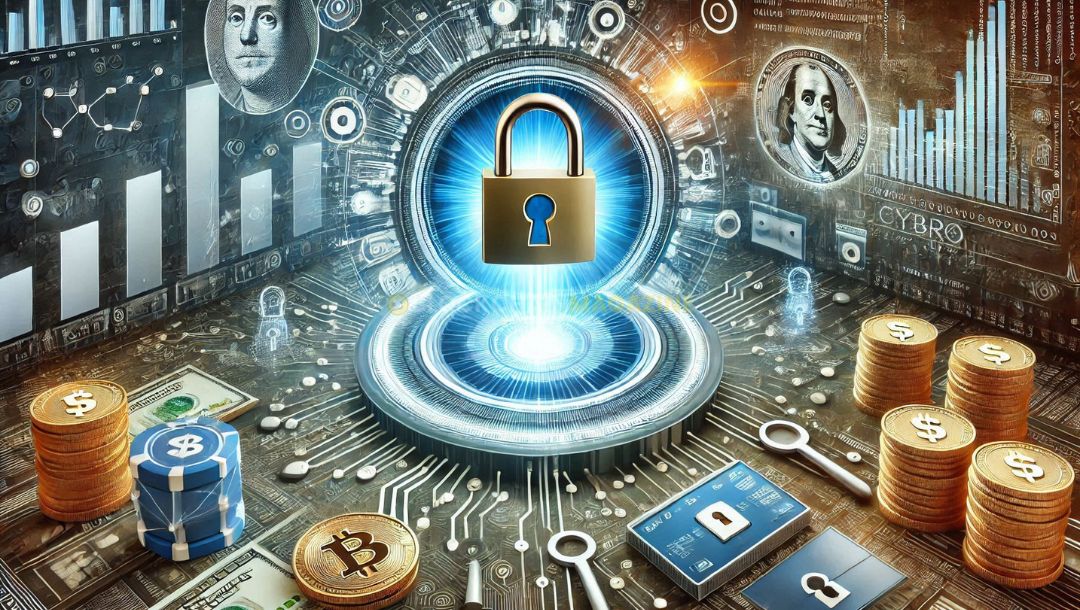
Home – Companies – Unlocking the Future of Finance With Cybro Crypto
Cybro Crypto is making waves in the finance world, and it’s not just hype. This digital currency is changing how people think about money, investments, and the future of finance. With unique features and a growing community, Cybro is quickly becoming a major player in the crypto space. Let’s explore what makes Cybro stand out and why it’s attracting so much attention.
Cybro Crypto is making waves in the financial world with its unique approach and offerings. It’s not just another cryptocurrency; it’s a comprehensive platform that’s changing how people think about digital finance. Cybro’s real strength lies in its ability to integrate advanced technology with practical financial solutions. This combination attracts a wide range of users, from individual investors to large financial institutions. Cybro offers something for everyone, whether you’re looking to maximize your returns or streamline your financial transactions.
Traditional finance is facing a formidable challenger in Cybro Crypto. By leveraging blockchain technology, Cybro is eliminating many of the inefficiencies that have plagued conventional financial systems for years. Here are some ways Cybro is making an impact:
Looking ahead, Cybro is poised to play a significant role in the evolution of cryptocurrency. With its innovative features and user-centric approach, Cybro is set to become a major player in the crypto space. It’s not just about offering a new digital currency; it’s about creating a new financial ecosystem. As the world moves towards a more digital and decentralized future, Cybro is leading the charge, setting new standards for what cryptocurrency can achieve.
Cybro is making waves with its AI-driven yield aggregation. Imagine a system that automatically optimizes your earnings, and that’s exactly what Cybro offers. This advanced technology analyzes market conditions to maximize returns, ensuring users get the best out of their investments. With the Blast blockchain, Cybro provides a seamless experience for users wanting to leverage AI in their crypto ventures.
Cybro stands out with its multichain capabilities, offering users access to a variety of blockchain networks. This feature not only enhances flexibility but also broadens investment opportunities. By bridging different chains, Cybro allows investors to maximize their earnings without being confined to a single blockchain. This multichain approach is a game-changer in the crypto world, providing a unique edge to CYBRO’s earn marketplace.
Security is paramount in the crypto space, and Cybro takes it seriously. The platform employs cutting-edge protocols to protect users’ assets. From robust encryption methods to advanced authentication processes, Cybro ensures that every transaction is secure. Users can invest with peace of mind, knowing their funds are safeguarded against potential threats.
Cybro’s commitment to innovation and security makes it a standout in the ever-evolving world of cryptocurrency. With AI-driven strategies and multichain flexibility, Cybro is setting new standards for what a crypto platform can achieve.
Cybro Crypto’s presale has been nothing short of sensational, capturing the attention of investors globally. Riding the wave of enthusiasm, the presale has already surpassed $5.5 million, with each token priced at just $0.045. This has attracted over 20,000 investors eager to jump into this promising venture. The buzz around Cybro is not just about its current price but its potential to mirror the success of other major cryptocurrencies like Solana.
Investors are eyeing Cybro for its potential return on investment (ROI), which experts predict could soar up to 1200%. Such optimism is fueled by the token’s strategic positioning in the market and its technological advancements. Cybro’s multichain capabilities and AI-driven strategies make it a formidable player in the crypto space. Here’s a quick look at the projected growth:
Jumping on the Cybro bandwagon is straightforward. Here’s how you can get involved:
Joining the Cybro movement now could be a game-changer for your investment portfolio. With its innovative approach and strong market interest, Cybro is poised to be a significant player in the cryptocurrency landscape.
Cybro’s presale is a golden opportunity for those looking to invest in a cryptocurrency with a promising future. The combination of low entry prices and high growth potential makes it an attractive option for both new and seasoned investors.
Cybro is being compared to Solana due to its potential for substantial growth. Just like Solana, which experienced a meteoric rise, Cybro is gaining traction as a multichain gateway. This functionality allows users to access various blockchain networks seamlessly, enhancing its appeal. Solana’s strength lies in its high-performance blockchain designed for decentralized applications, and Cybro seems poised to follow a similar path by offering unique yield farming opportunities and AI-optimized portfolios. The anticipation around Cybro’s rise is palpable, with many hoping it mirrors Solana’s success in the crypto market.
Ethereum and Cardano are giants in the crypto space, known for their smart contract capabilities and robust ecosystems. However, Cybro’s edge comes from its innovative multichain capabilities and AI-driven yield aggregation. These features allow Cybro to offer more flexible and efficient ways to earn returns, appealing to both new and seasoned investors. While Ethereum and Cardano focus on scalability and security, Cybro’s focus on maximizing earnings through advanced technology sets it apart.
Crypto whales are taking notice of Cybro due to its impressive presale figures and potential for high returns. The presale success, which has already surpassed significant milestones, indicates strong market confidence. With only a limited number of tokens available during the presale, whales see this as a one-in-a-million opportunity to invest early in a project with a predicted ROI of up to 1200%. The combination of staking rewards, airdrops, and cashback offers further sweetens the deal, making Cybro an attractive option for those looking to maximize their crypto holdings.
Cybro token holders are in for a treat with competitive staking rewards. By leveraging advanced AI-driven strategies, investors can maximize their earnings. Not only that, but exclusive airdrops mean you get extra tokens as the project grows. It’s like getting a bonus just for being part of the community.
Navigating the crypto world can get pricey, but Cybro offers reduced trading and lending fees to ease the burden. It’s a simple way to save money while you explore the market. Plus, cashback offers on purchases mean you get more bang for your buck, making every transaction a little sweeter.
In the volatile world of cryptocurrency, security is everything. Cybro provides a robust insurance program that protects your investments, giving you peace of mind. With comprehensive coverage, you can focus on growing your portfolio without the constant worry of unexpected losses.
Holding Cybro tokens not only opens doors to financial benefits but also ensures that you are part of a secure and growing ecosystem. It’s a chance to be on the cutting edge of crypto innovation while enjoying tangible rewards.
Cybro Crypto is setting the stage for a future where financial services are accessible to everyone. Imagine a world where your location or economic status doesn’t limit your financial opportunities. Cybro is working towards this by creating a platform that breaks down traditional barriers, allowing anyone to participate in the financial ecosystem. This vision aligns with the broader goals of decentralized finance, which aims to democratize access to financial tools and services.
Cybro’s integration into the global financial markets could be transformative. By offering innovative solutions like AI-driven yield aggregation and multichain capabilities, Cybro is poised to make waves across various financial sectors. The potential for Cybro to streamline processes, reduce costs, and improve efficiency is significant, potentially leading to a more inclusive and dynamic financial landscape.
Looking forward, Cybro is focused on expanding its reach and influence. This involves continuous technological advancements and strategic partnerships. Cybro aims to not only be a leader in the crypto space but also a key player in the broader financial markets. As Cybro continues to grow, its impact on both individual investors and financial institutions is expected to increase, paving the way for a new era in finance.
Cybro Crypto is not just about changing how we handle money today; it’s about envisioning a future where every individual has the power to control and grow their wealth. As Cybro continues to innovate and expand, it stands to redefine the financial landscape, making it more inclusive and accessible for all.
Cybro is not just about technology; it’s about people. The community around Cybro is growing rapidly, driven by shared enthusiasm and a common goal to redefine finance. This is a space where everyone from seasoned crypto veterans to curious newcomers can find their place. The community thrives on active participation, whether it’s through forums, social media discussions, or community events.
The strength of Cybro lies in its community, a diverse group united by a shared vision for the future of decentralized finance.
Cybro’s ecosystem is bolstered by strategic partnerships that enhance its capabilities and reach. Collaborations with tech firms, financial institutions, and blockchain innovators have been crucial in expanding Cybro’s offerings.
These partnerships not only improve Cybro’s technology but also solidify its position in the market, attracting interest from investors and users alike. Supra Crypto is an example of a project that shares a similar community-driven approach, aiming for significant growth in the decentralized finance sector.
Looking ahead, Cybro is focused on continuous innovation and development. Upcoming features and improvements are set to make the platform even more user-friendly and efficient.
Cybro’s roadmap is filled with promising developments that aim to keep it at the forefront of the crypto world. The future is bright for Cybro and its community, as they continue to build a robust and inclusive ecosystem.
So, there you have it. Cybro Crypto is not just another name in the crypto world; it’s a game-changer. With its innovative approach and promising presale success, it’s clear that Cybro is set to make waves. Whether you’re a seasoned investor or just dipping your toes into the crypto waters, keeping an eye on Cybro could be a smart move. The future of finance is evolving, and Cybro is right at the forefront, ready to lead the charge. Don’t miss out on what could be the next big thing in digital currency.
Cybro Crypto is a digital currency designed to offer unique opportunities in the financial world through its advanced technologies and multichain capabilities.
Cybro Crypto uses blockchain technology to provide decentralized financial services, which can be faster and more secure compared to traditional banking systems.
Cybro token holders can enjoy perks like staking rewards, reduced fees, and insurance benefits, making it a valuable investment.
You can invest in Cybro Crypto by participating in its presale events or buying tokens through cryptocurrency exchanges once they’re listed.
Cybro Crypto is seen as a promising investment due to its innovative technology, strong market interest, and potential for high returns.
Cybro Crypto employs advanced security protocols and features to protect users’ investments and ensure safe transactions.
Stay informed with daily updates from Blockchain Magazine on Google News. Click here to follow us and mark as favorite: [Blockchain Magazine on Google News].
Stay ahead of the curve with expert analysis and market updates.
Disclaimer: Any post shared by a third-party agency are sponsored and Blockchain Magazine has no views on any such posts. The views and opinions expressed in this post are those of the clients and do not necessarily reflect the official policy or position of Blockchain Magazine. The information provided in this post is for informational purposes only and should not be considered as financial, investment, or professional advice. Blockchain Magazine does not endorse or promote any specific products, services, or companies mentioned in this posts. Readers are encouraged to conduct their own research and consult with a qualified professional before making any financial decisions.
Blockchain Magazine is a leading authority in the realm of blockchain and cryptocurrency, offering comprehensive coverage and insightful analysis of this dynamic industry.
About
About
Editorial Team
Careers
BM Press
Get in touch
Contact Us
Advertise
Sitemap
Author Program
Fine Print
Editorial Policy
Ethics Policy
Terms of Use
Privacy Policy
Important Links
About
About
Editorial Team
Careers
BM Press
Get in touch
Contact Us
Advertise
Sitemap
Author Program
Fine Print
Editorial Policy
Ethics Policy
Terms of Use
Privacy Policy
Important Links
© 2015 – 2024 Blockchain Magazine Now in USA | Singapore | India • All Rights Reserved.
Looking to expand your reach in the blockchain industry? Advertise with Blockchain Magazine and connect with a highly engaged global audience.
For more information on our audience demographics, statistics, and advertising opportunities, visit our detailed Advertise page.
📧 Reach us at: info@blockchainmagazine.com
💬 Or DM us on Telegram: @blockchainmagazineofficial
You can also submit the form below and we will reach out to you within 24 hours.
Stay ahead of the curve with expert analysis, market updates, and exclusive content curated by our team of blockchain enthusiasts.
I have read and agree to the Terms and Conditions and Privacy Policy
Press “ESC” key to close












